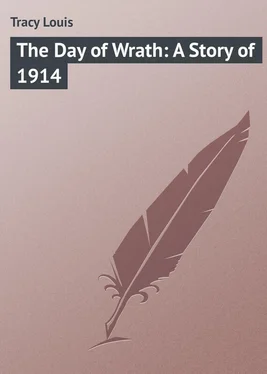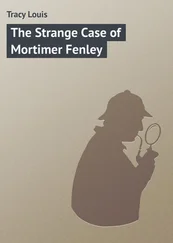Louis Tracy - The Day of Wrath - A Story of 1914
Здесь есть возможность читать онлайн «Louis Tracy - The Day of Wrath - A Story of 1914» — ознакомительный отрывок электронной книги совершенно бесплатно, а после прочтения отрывка купить полную версию. В некоторых случаях можно слушать аудио, скачать через торрент в формате fb2 и присутствует краткое содержание. Жанр: foreign_prose, на английском языке. Описание произведения, (предисловие) а так же отзывы посетителей доступны на портале библиотеки ЛибКат.
- Название:The Day of Wrath: A Story of 1914
- Автор:
- Жанр:
- Год:неизвестен
- ISBN:нет данных
- Рейтинг книги:5 / 5. Голосов: 1
-
Избранное:Добавить в избранное
- Отзывы:
-
Ваша оценка:
- 100
- 1
- 2
- 3
- 4
- 5
The Day of Wrath: A Story of 1914: краткое содержание, описание и аннотация
Предлагаем к чтению аннотацию, описание, краткое содержание или предисловие (зависит от того, что написал сам автор книги «The Day of Wrath: A Story of 1914»). Если вы не нашли необходимую информацию о книге — напишите в комментариях, мы постараемся отыскать её.
The Day of Wrath: A Story of 1914 — читать онлайн ознакомительный отрывок
Ниже представлен текст книги, разбитый по страницам. Система сохранения места последней прочитанной страницы, позволяет с удобством читать онлайн бесплатно книгу «The Day of Wrath: A Story of 1914», без необходимости каждый раз заново искать на чём Вы остановились. Поставьте закладку, и сможете в любой момент перейти на страницу, на которой закончили чтение.
Интервал:
Закладка:
“Miss Beresford!” he said, in a sibilant hiss which would carry easily to the point where he had left her. No answer. Nature was still. It was as though inanimate things were awake, but quaking. The breathing of the unnamed German changed abruptly into a gurgling croak. Heinrich had traversed that stage swiftly under the second blow. From the roads came the sharp rattle of horses’ feet, the panting of motors. The thud of gun-fire smote the air incessantly. It suggested the monstrous pulse-beat of an alarmed world. Over a hilltop the beam of a searchlight hovered for an instant, and vanished. Belgium, little Belgium, was in a death-grapple with mighty Germany. Even in her agony she was crying, “What of England? Will England help?” Well, one Englishman had lessened by two the swarm of her enemies that night.
Dalroy was only vaguely conscious of the scope and magnitude of events in which he was bearing so small a part. He knew enough of German methods in his immediate surroundings, however, to reck as little of having killed two men as though they were rats. His sole and very real concern was for the girl who answered not. Before going in search of her he was tempted to don a Pickel-haube , which, with the rifle and bayonet, would, in the misty light, deceive any new-comers. But the field appeared to be untenanted, and it occurred to him that his companion might actually endeavour to hide if she took him for a German soldier. So he did not even carry the weapon.
He found Irene at once. She had simply fainted, and the man who now lifted her limp form tenderly in his arms was vexed at his own forgetfulness. The girl had slept but little during two nights. Meals were irregular and scanty. She had lived in a constant and increasing strain, while the real danger and great physical exertion of the past few minutes had provided a climax beyond her powers.
Like the mass of young officers in the British army, Dalroy kept himself fit, even during furlough, by long walks, daily exercises, and systematic abstention from sleep, food, and drink. If a bed was too comfortable he changed it. If an undertaking could be accomplished equally well in conditions of hardship or luxury he chose hardship. Soldiering was his profession, and he held the theory that a soldier must always be ready to withstand the severest tax on brain and physique. Therefore the minor privations of the journey from Berlin, with its decidedly strenuous sequel at Aix-la-Chapelle, and this D’Artagnan episode in the neighbourhood of Visé, had made no material drain on his resources.
A girl like Irene Beresford, swept into the sirocco of war from the ordered and sheltered life of a young Englishwoman of the middle-classes, was an altogether different case. He believed her one of the small army of British-born women who find independence and fair remuneration for their services by acting as governesses and ladies’ companions on the Continent. Nearly every German family of wealth and social pretensions counted the Englische Fräulein as a member of the household; even in autocratic Prussia, Kultur is not always spelt with a “K.” She was well-dressed, and supplied with ample means for travelling; but plenty of such girls owned secured incomes, treating a salary as an “extra.” Moreover, she spoke German like a native, had a small sister in Brussels, and had evidently met Von Halwig in one of the great houses of the capital. Undoubtedly, she was a superior type of governess, or, it might be, English mistress in a girls’ high school.
These considerations did not crowd in on Dalroy while he was holding her in close embrace in a field near Visé at dawn on the morning of Wednesday, 5th August. They were the outcome of nebulous ideas formed in the train. At present, his one thought was the welfare of a hapless woman of his own race, be she a peer’s daughter or a postman’s.
Now, skilled leader of men though he was, he had little knowledge of the orthodox remedies for a fainting woman. Like most people, he was aware that a loosening of bodices and corsets, a chafing of hands, a vigorous massage of the feet and ankles, tended to restore circulation, and therefore consciousness. But none of these simple methods was practicable when a party of German soldiers might be hunting for both of them, while another batch might be minded to follow “Heinrich” and his fellow-butcher. So he carried her to the stable and laid her on a truss of straw noted during that first vivid glimpse of the interior.
Then, greatly daring, he milked the cow.
Not only did the poor creature’s suffering make an irresistible appeal, but in relieving her distress he was providing the best of nourishment for Irene and himself. The cow gave no trouble. Soon the milk was flowing steadily into the pail. The darkness was abysmal. On one hand lay a dead woman, on the other an unconscious one, and two dead men guarded the doorway. Once, in Paris, Dalroy had seen one of the lurid playlets staged at the Grand Guignol, wherein a woman served a meal for a friend and chatted cheerfully during its progress, though the body of her murdered husband was stowed behind a couch and a window-curtain. He recalled the horrid little tragedy now; but that was make-believe, this was grim reality.
Yet he had ever an eye for the rectangle of the doorway. When a quality of grayness sharpened its outlines he knew it was high time to be on the move. Happily, at that instant, Irene sighed deeply and stirred. Ere she had any definite sense of her surroundings she was yielding to Dalroy’s earnest appeal, and allowing him to guide her faltering steps. He carried the pail and the rifle in his left hand. With the right he gripped the girl’s arm, and literally forced her into a walk.
The wood indicated by Maertz was plainly visible now, and close at hand, and the first rays of daylight gave colour to the landscape. The hour, as Dalroy ascertained later, was about a quarter to four.
It was vitally essential that they should reach cover within the next five minutes; but his companion was so manifestly unequal to sustained effort that he was on the point of carrying her in order to gain the protection of the first hedgerow when he noticed that a slight depression in the hillside curved in the direction of the wood. Here, too, were shrubs and tufts of long grass. Indeed, the shallow trough proved to be one of the many heads of a ravine. The discovery of a hidden way at that moment contributed as greatly as any other circumstance to their escape. They soon learnt that the German hell-hounds were in full cry on their track.
At the first bend Dalroy called a halt. He told Irene to sit down, and she obeyed so willingly that, rendered wiser by events, he feared lest she should faint again.
When travelling he made it a habit to carry two handkerchiefs, one for use and one in case of emergency, such as a bandage being in sudden demand, so he was able to produce a square of clean cambric, which he folded cup-shape and partly filled with milk. It was the best substitute he could devise for a strainer, and it served admirably. By this means they drank nearly all the milk he had secured, and, with each mouthful, Irene felt a new eichor in her veins. For the first time she gave heed to the rifle.
“How did you get that?” she asked, wide-eyed with wonder.
“I picked it up at the door of the shed,” he answered.
“I remember now,” she murmured. “You left me under a hedge while you crept forward to investigate, and I was silly enough to go off in a dead faint. Did you carry me to the shed?”
“Yes.”
“What a bother I must have been. But the finding of a rifle doesn’t explain a can of milk.”
“The really important factor was the cow,” he said lightly. “Now, young lady, if you can talk you can walk. We have a little farther to go.”
Читать дальшеИнтервал:
Закладка:
Похожие книги на «The Day of Wrath: A Story of 1914»
Представляем Вашему вниманию похожие книги на «The Day of Wrath: A Story of 1914» списком для выбора. Мы отобрали схожую по названию и смыслу литературу в надежде предоставить читателям больше вариантов отыскать новые, интересные, ещё непрочитанные произведения.
Обсуждение, отзывы о книге «The Day of Wrath: A Story of 1914» и просто собственные мнения читателей. Оставьте ваши комментарии, напишите, что Вы думаете о произведении, его смысле или главных героях. Укажите что конкретно понравилось, а что нет, и почему Вы так считаете.












